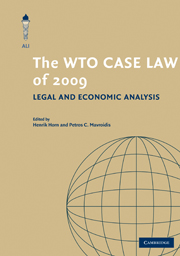Book contents
- Frontmatter
- Contents
- Foreword
- Introduction
- US Compliance with WTO Rulings on Zeroing in Anti-Dumping
- United States – Continued Existence and Application of Zeroing Methodology: the end of Zeroing?
- Incomplete Harmonization Contracts in International Economic Law: Report of the Panel, China – Measures Affecting the Protection and Enforcement of Intellectual Property Rights, WT/DS362/R, adopted 20 March 2009
- Comment
- Trading Cultures: Appellate Body Report on China–Audiovisuals
- Comment
- ‘Optimal’ Retaliation in the WTO – a commentary on the Upland Cotton Arbitration
Foreword
Published online by Cambridge University Press: 05 December 2011
- Frontmatter
- Contents
- Foreword
- Introduction
- US Compliance with WTO Rulings on Zeroing in Anti-Dumping
- United States – Continued Existence and Application of Zeroing Methodology: the end of Zeroing?
- Incomplete Harmonization Contracts in International Economic Law: Report of the Panel, China – Measures Affecting the Protection and Enforcement of Intellectual Property Rights, WT/DS362/R, adopted 20 March 2009
- Comment
- Trading Cultures: Appellate Body Report on China–Audiovisuals
- Comment
- ‘Optimal’ Retaliation in the WTO – a commentary on the Upland Cotton Arbitration
Summary
This is the seventh volume analyzing legal decisions of the World Trade Organization for publication by The American Law Institute (ALI) and the Cambridge University Press. The WTO decisions, most of them from the Appellate Body, demonstrate a gradual process of creating trade law doctrine that applies one of the world's most important treaties to significant economic disputes. We believe that the contributions made by economists and lawyers in describing and criticizing the WTO's outcomes and the reasoning that supports them are a step toward the establishment of a body of international law that is now, and will increasingly be, essential to a world economy based on huge cross-border trade. Our books have now analyzed all the important WTO decisions issued in the first decade of the twenty-first century.
The ALI is also at work on books that propose governing principles for trade law. In 2008, we published The Genesis of the GATT, by Professors Douglas A. Irwin, Petros C. Mavroidis, and Alan O. Sykes. In the next year, we expect to publish a comprehensive analysis of the principle of nondiscrimination in international trade, with particular attention to the economics of trade agreements. The volume will discuss nondiscrimination with regard to both border instruments (GATT Article I) and domestic instruments (GATT Article III (national treatment)).
- Type
- Chapter
- Information
- The WTO Case Law of 2009Legal and Economic Analysis, pp. vii - viiiPublisher: Cambridge University PressPrint publication year: 2011

